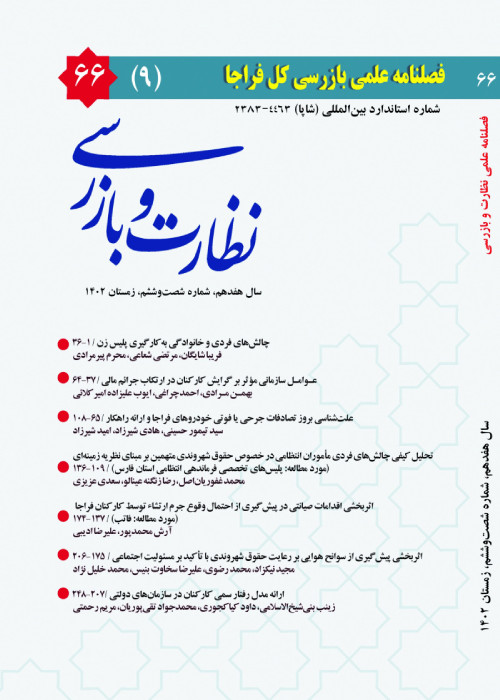Identifying and Investigating the Factors Affecting the Possibility of Deviating Normality and Committing of NAJA’s Staff
The existence of deviations and even inappropriate or divergent norms in advisory-regulatory organizations such as NGOs is far more harmful than other non-governmental organizations. Therefore, the need to combat diversion norms in such organizations is twofold. On the other hand, the capacity of normativity (especially inappropriate and diverse norms) varies among individuals and employees. Some people are more resistant to admission of deviant norms in the work environment and some are less resistant. Therefore, the purpose of this study is to identify and investigate the factors affecting the level of diversion of NAJA staff so that it can prevent the spread of diversion norms among employees and increase the level of organizational health. In order to achieve this goal, after studying and compiling the existing background, a mixed method design (sequential exploratory design) was used. In the first phase of the design (qualitative study), with 20 experts from NAJA and academic experts, interviews were conducted to identify the factors affecting the diversion normativity, and then, based on the analysis of these qualitative data, effective factors were identified and a questionnaire for data collection in the second phase of design (quantitative study) was prepared. In the second phase, a sample of 990 people was selected using stratified sampling method from the statistical population of the study (i.e. all staff working in NAJA at three levels of officers). The analyzed data confirmed that among the identified factors in qualitative study, subculturial pressure, subordination morale, utilitarian ethical thinking, and extreme supervision, have a positive and significant effect on the diversional normality of NAJA employees. Also, based on the priority of the action, the data obtained from NAJA showed that the priority in the field of corrective actions is first with a utilitarian ethical thinking, and then with subordination and subculture pressure. In addition, comparing the comparison of sample subgroups showed that the effect of subculture pressure on young employees and employees with less education was higher than that of older employees and employees with higher education; the deviant effect of subordination morale was higher in employees with higher education, and the deviant effect of utilitarian ethical thinking on lower income officers is far higher than those with higher incomes.
- حق عضویت دریافتی صرف حمایت از نشریات عضو و نگهداری، تکمیل و توسعه مگیران میشود.
- پرداخت حق اشتراک و دانلود مقالات اجازه بازنشر آن در سایر رسانههای چاپی و دیجیتال را به کاربر نمیدهد.


